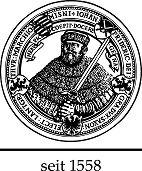|
Friedrich-Schiller-University (FSU Jena)  The Friedrich-Schiller-University is a public university located in Jena, Germany, founded in 1558 and thus being among the oldest universities in Germany. Today more than 19.000 students are enrolled. The Department of Earth Observation at the Institute of Geography at the Friedrich-Schiller-University of Jena was established in January 2000 and is directed by Prof. Dr. Christiane Schmullius. At present it has a staff of 22 researchers (4 with university positions) and 2 administrative personnel. Research and teaching is focusing on (i) applied remote sensing for land cover mapping (agriculture, forestry), land surface parameter retrieval for hydrological, vegetation and climate models (fractional land cover, above ground biomass, plant phenology, soil moisture); (ii) remote sensing research: signal analysis on geophysical information content, radar interferometry applications, image processing, preparation of future space missions; and (iii) integration of earth observation and geoinformatics. The team was or is still involved as coordinator or project partner in many international research projects, e.g. SIBERIA-I & -II, BIOMASAR-I & -II, ZAPAS, Kyoto & Carbon, GSE Forest Monitoring, GOFC-GOLD, ESA DUE Permafrost, ESA DUE GlobBiomass, FP7 EuRuCAS, Forest Dragon-1/-2/-3 as well as remote sensing campaigns and has gained great international reputation for its work in forest biomass mapping and promoting microwave remote sensing for a multitude of applications. The Department of Earth Observation possesses besides an image processing and GIS laboratory for teaching, research and product generation, various technical instruments such as (1) a Terrestrial, Hemispheric, full-waveform laser scanner (Riegl TLS VZ-100), (2) Octocopter (GeoCopter X 8000) with multi-spectral camera including analysis software (3) Soil moisture measurement network under forest (4) Fieldspec3 field spectrometer (350-2500 nm) and (5) a LAI2200 Plant Canopy Analyser (Chlorophyllmeter SPAD-520Plus and Microtops II Sunphotometer 540). The Computer Vision Group belongs to the Institute of Computer Science at the Friedrich-Schiller-University of Jena and is headed by Prof. Dr. Joachim Denzler. At present its team consists of 13 researchers, 2 senior researchers, and 2 administrative personnel. The group is working on topics related to basic computer vision research as well as industrial projects with partners from the optical and automotive industry. Specifically, the group contributes internationally to the area of machine learning for computer vision and related fields, like object recognition, incremental learning, and sensor data fusion for state estimation. Other relevant areas are 3D computer vision in sensor networks, like event detection in videos, multi-camera object tracking, and 3D reconstruction. The team is well known for its contribution in the area of Gaussian processes for learning, classification and regression tasks. The main achievements during the past five years, including best paper awards, have been in large scale Gaussian processes, active learning, and novelty detection. The latter topic is specifically important for the project since very general anomaly and novelty detection methods have been developed by the group recently. Publications are regularly among the 20% accepted papers of the major computer vision conferences. The team builds upon a software infrastructure developed by the group itself, which is also used as the basis for industrial projects. OUR ROLE IN BACI Department of Earth Observation, Institute of Geography
Computer Vision Group Department of Mathematics and Computer Science
KEY PEOPLE Department of Earth Observation, Institute of Geography Computer Vision Group, Department of Mathematics and Computer Science |
BACI: 2015-2019
TOWARDS A BIOSPHERE ATMOSPHERE CHANGE INDEX

